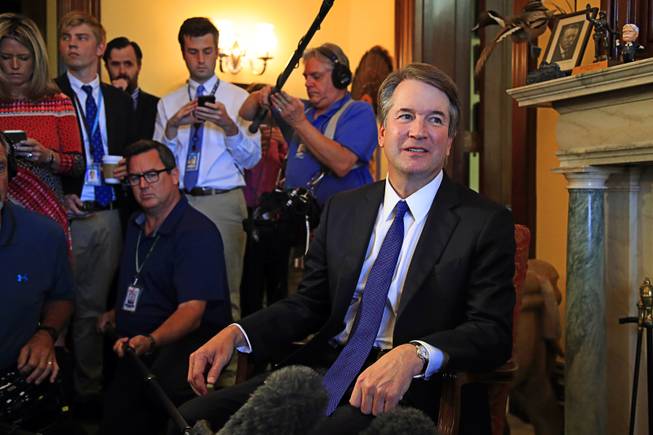
Manuel Balce Ceneta / AP
Supreme Court nominee Brett Kavanaugh listens to Sen. Rob Portman, R-Ohio, on Capitol Hill in Washington, during a meeting Wednesday, July 11, 2018.
Monday, July 23, 2018 | 2 a.m.
View more of the Sun's opinion section
Editor’s note: Today, the Sun launches an occasional series of guest columns focusing on the nomination of Brett Kavanaugh for the U.S. Supreme Court.
The decision on whether to send Judge Brett Kavanaugh to the U.S. Supreme Court is in the Senate’s hands, but let’s ponder what might happen if it were instead up to the American people to evaluate and vote on his confirmation.
What would Americans’ criteria be for determining a successful nominee?
Public Policy Polling conducted a national survey of 724 voters this month following news of Justice Anthony Kennedy’s retirement to help answer that question. The poll focused heavily on concerns related to access to reproductive care and the future of the Affordable Care Act.
The overturning of Roe v. Wade has been one of President Donald Trump’s litmus tests for judicial nominees. But by contrast, 56 percent of voters said the Senate should “reject a nominee to the Supreme Court who would vote to completely overturn Roe v. Wade, thus invalidating a woman’s right to have an abortion.” Even among moderate voters, 71 percent say they would hope to see such a nominee rejected.
Kavanaugh promised to follow precedent faithfully in his 2006 hearing during his confirmation to the D.C. Circuit Court, but in remarks made during a speech he gave last year, Kavanaugh spoke highly of Justice William Renquist’s dissent in both Roe and Planned Parenthood v. Casey, another famous abortion case. This suggests that Kavanuagh’s true convictions are sympathetic to opponents of Roe, meaning any abortion case that reaches a Kavanaugh Supreme Court should make advocates of reproductive freedom nervous.
Another issue dominating headlines is the potential impact of this nomination on the future of the Affordable Care Act. Last month, the Justice Department announced it would no longer defend against legal challenges to the law, specifically, the mandated coverage for pre-existing conditions. This abdication of responsibility is concurrent with a lawsuit brought by attorneys general from 20 states, led by Texas, to overturn those provisions. Striking down the ACA would put at risk the 130 million Americans with a pre-existing condition who rely on said provisions for life-saving coverage.
According to the same poll, 78 percent of voters believe in rejecting a Supreme Court nominee who would rule to allow insurance companies to discriminate against those with pre-existing conditions, compared with only 12 percent who think the nominee should be approved. This overwhelming majority not only includes voters who describe themselves as liberal, but moderates, somewhat conservative, and very conservative voters as well.
That puts the broad spectrum of Americans’ political beliefs at odds with Kavanaugh’s record on the ACA. In the 2011 lawsuit against the ACA, Kavanaugh wrote in his dissent to the D.C. Circuit that a president could decline to enforce provisions of the law, even if the court upheld its constitutionality. Further, he took great issue with Justice John Roberts joining the majority decision which upheld the Affordable Care Act in that same case, raising concerns that Kavanaugh, should he be confirmed, may have the chance to undo the ACA for good.
With Kavanaugh appearing to be so out of touch with American voters across the political spectrum on such critical issues, it raises the question of who he’ll serve as a Supreme Court justice. Was he selected to act as a fair-minded arbiter of the Constitution for all Americans? Or was he chosen because of his record of narrow-minded decisions in favor of the wealthy and special interests that place people and planet as secondary to corporate profit and expanded executive authority?
In future columns written by partner organizations of the Nevadans for Judicial Progress coalition, fair judiciary advocates will explore the various ways in which Kavanaugh is a threat to regular Americans’ access to justice, on issues ranging from the environment, immigration and LGBT civil rights, to policies that benefit working families. As you read, imagine that you were a senator tasked with evaluating Kavanaugh’s record in preparation for a vote. What questions would you have for him? Join the conversation and share your thoughts at bit.ly/AskKavanaugh.
Will Pregman is a community organizer with Battle Born Progress and lead organizer with the Nevadans for Judicial Progress coalition. He was raised in Las Vegas and has a political science degree from UNLV.
